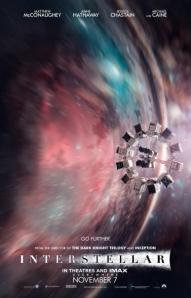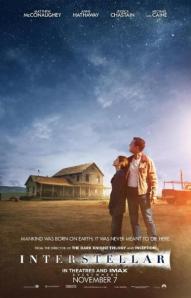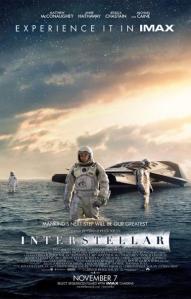I was all prepared and excited to watch another Christopher Nolan Movie – INTERSTELLAR.
He is like God to some Filmmakers like me (Although there are many Gods
out there – Steven Spielberg, Stanley Kubrick, George Lucas, Martin
Scorsese, etc, the list is long). Nolan Movie is something where you
need to use your brain, not like our usual Bollywood Films (although I
like Bollywood Films). I reached the theatre early; I had booked ticket
online earlier. I got inside the multiplex and bought myself some
snacks. While endless trailers were running on screen, I finished with
the food and settled in the seat for the epic sci-fi called
INTERSTELLAR. The theatre was full, the mood was good, seemed like this
audience was ready to be blown away…I was…
169 minutes later, that same audience came out of the film with a rather muted response…and so was I…
Those who did not understand the film walked out of the screen in the
speed of the space shuttle, and those who were confused remained seated
in the seats, may be they still were on different planet of another
galaxy, or may be they were stuck inside the Black Hole somewhere.
Frankly, the final 15 minutes of the film will put even the most loyal
of Nolan fans to the test.
Later I read these lines online somewhere about the Film: There are
times, when the science and the sentimentality, and the silliness work
hand in hand, however, there are those times when the sentimentality and
silliness overtake the science, and that’s not good. The sentimentality
and silliness are laid on pretty thick by Nolan here. Nicely Put!
Now I could say one thing only – The film is very much like a Nolan film, and nothing at all like one.
In
the end this film is about a father and a daughter relationship, and
Nolan’s films in the end have consistently been about those same things.
Inception is about someone getting back to his kids, he’s lost his wife, etc. The same is true of his incarnation of Batman, a lost father theme. The main emotional crux of Interstellar
is the relationship Cooper has with Murph. Cooper agrees to try to save
the world for humanity because his daughter is a part of that future.
Everything else around or about the film, both plot wise and scientific
wise, HAS to revolve around that main emotional story of the father and
daughter.
I don’t want this to sound like a negative review, there are things
about the film that are simply incredible. Nolan, a champion of shooting
on film, is one of the few filmmakers left with faith in the power of
the image. The film looks mind-blowing and gorgeous. Interstellar
is made purely with the power of cinematic spectacle. In other words,
it’s a film you’ll pay that over-budget multiplex ticket price for, and
feel like you’ve come out seeing something that was so unique to the
movie theatre going experience.
Interstellar, isn’t as rigorous to the balance of emotion
and science as other Nolan films like Memento, The Prestige, Batman
series and Inception. This means the film essentially succumbs to its
own sentimentality, and depends upon how YOU look at the film. And that can be a flaw for many.
The story isn’t perfect; for example, while I loved the
father-daughter theme, I felt the son isn’t always portrayed in a very
flattering way. And I’m not quite sure why Matt Damon’s character is in
the film — for me, that sequence distracted from the main story line.
Having said that, the movie made me think — and not many movies do that these days for sure.
I can’t deny that there’s more good things in Interstellar than bad, and the good stuff is so awe inspiring, I can safely say I let go Nolan’s ‘flaws’. The
spectacle means something. Nolan’s approach DOES connect with you on an
emotional level, sometimes the emotion is awe, but it’s fundamentally
about family, which runs all throughout a lot of Nolan films.
‘INTERSTELLAR’ features this classic poem by Dylan Thomas:
Do not go gentle into that good night
Do not go gentle into that good night,
Old age should burn and rave at close of day;
Rage, rage against the dying of the light.
Old age should burn and rave at close of day;
Rage, rage against the dying of the light.
Though wise men at their end know dark is right,
Because their words had forked no lightning they
Do not go gentle into that good night.
Because their words had forked no lightning they
Do not go gentle into that good night.
Good men, the last wave by, crying how bright
Their frail deeds might have danced in a green bay,
Rage, rage against the dying of the light.
Their frail deeds might have danced in a green bay,
Rage, rage against the dying of the light.
Wild men who caught and sang the sun in flight,
And learn, too late, they grieved it on its way,
Do not go gentle into that good night.
And learn, too late, they grieved it on its way,
Do not go gentle into that good night.
Grave men, near death, who see with blinding sight
Blind eyes could blaze like meteors and be gay,
Rage, rage against the dying of the light.
Blind eyes could blaze like meteors and be gay,
Rage, rage against the dying of the light.
And you, my father, there on the sad height,
Curse, bless, me now with your fierce tears, I pray.
Do not go gentle into that good night.
Rage, rage against the dying of the light.
Do not go gentle into that good night.
Rage, rage against the dying of the light.





